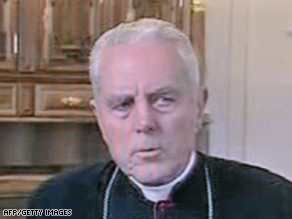
BUENOS AIRES, Argentina (CNN) -- Bishop Richard Williamson, who last month denied the existence of the Holocaust in an interview with Swedish television, was ordered Thursday to leave Argentina within 10 days, the Ministry of Interior said.
"The bishop has repeatedly forged the true motive for his stay in the country, having declared that he is an employee of 'La Tradicion' Civil Society when, in reality, his true activity was as priest and seminary director of the Society of Saint Pius X in the neighborhood of Moreno," Interior Minister Florencio Randazzo said in a written statement.
Williamson and three other bishops who belong to the Society of Saint Pius X were excommunicated in 1988. The society was founded by Archbishop Marcel Lefebrve, who rebelled against the Vatican's modernizing reforms in the 1960s, and who consecrated the men in unsanctioned ceremonies.
"Williamson has had public notoriety following his anti-Semitic statements to Swedish media in which he questioned whether Jewish people were victims of the Holocaust," Randazzo continued.
"For these reasons, along with the strong condemnation from the Argentine government of how statements like these harm Argentine society, the Jewish community, and all of humanity by trying to deny a historic truth, the national government has decided to demand that the Bishop leave the country or be expelled."
In the interview with Swedish television, Williamson said, "I believe that the historical evidence is strongly against -- is hugely against -- 6 million Jews having been deliberately gassed in gas chambers as a deliberate policy of Adolf Hitler.
I believe there were no gas chambers," he stated.
Williamson, who had already been removed from his seminary post in Argentina, made headlines in January when he and three other ultra-conservative bishops were welcomed back into the Roman Catholic Church, more than 20 years after Pope John Paul II excommunicated them on a theological question unrelated to the Holocaust.
The rehabilitation of Williamson sparked condemnation from Israel, American Jewish leaders and German Chancellor Angela Merkel, among others.
The Vatican pointed to several statements by Pope Benedict XVI condemning the destruction of European Jewry. The pope said he did not know of Williamson's views on the Holocaust when he lifted the excommunication.
The Vatican said Williamson will not be allowed to perform priestly functions until he recants his Holocaust denial.
Williamson apologized for "distress" his remarks caused the pope, but has not retracted them.
Last week, a German court refused to intervene on behalf of Williamson, who is facing prosecution for denying the Holocaust -- a crime in Germany.




